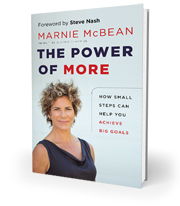 See the Spaces
See the Spaces
An excerpt from The Power of More, How Small Steps Help You Achieve Big Goals
… I was burnt out, exhausted both physically and emotionally. I needed a change, so at the age of twenty-eight I retired from sport. Or so I thought. The next year would help to remind me of some important and really doable goals that I had once set for myself.
In my retirement I unwrapped myself from my overprotective lifestyle and learned to snowboard in Whistler, B.C. I thought this would be a good time to go and play on a mountain instead of at a lake; I affectionately referred to this season as “the year of the broken bone.” Before retirement, my health had affected not only my performance but also that of my rowing partner. In this “arranged marriage,” Kathleen Heddle was my dependant, and I was hers. If I got sick or injured, I took Kathleen down with me; a port is no good without a star- board. This had made me particularly sensitive to the dangers of getting injured by doing something dumb. There would be little forgiveness if I showed up with a non-rowing injury. I had pretty much turned myself into a one-trick pony in bubble wrap. This was the first thing I wanted to change. I wanted to have fun, to be carefree, and I was prepared to accept the consequences. For the first time in a long while I felt as if I could take an unplanned risk. What joy!
Living in Whistler and learning to snowboard was fantastic, but I still craved structure and focus. At the suggestion of a friend, I took a course, got certified, and—with the help of Intrawest, the company that owned Whistler Blackcomb was quickly teaching adult beginner snowboarding. What a blast! I would free-ride in the morning with the other snowboard instructors, and then, from ten to noon each day, I’d teach a class. Saying that I snowboarded with the other instructors may be a bit of a stretch. The truth was that I had to do everything I could just to keep them in my sights. If this was a cup (of rice that) I was trying to fill, mine was still mostly empty.
Just as I hoped to progress and learn every day, I watched the other instructors improve their abilities too. They kept trying to get more height off a jump, to do a new trick, or to master a bigger feature. I watched how they would try every day but never put a timeline on their learning. They were definitely ambitious about snowboarding, but they were also patient. It made me realize that I had forgotten patience when I was rowing. I was also struck by how playful sport can be— there was so much joy.
The lifestyle I created as a snowboard instructor made a few other things apparent to me. Not the least was that I wasn’t cut out to be a great snowboarder! I missed rowing— the aesthetics of it, the challenge, and the way it mentally and physically tested me. I still craved taking something that I really “got” and discovering all that was left to learn. I wanted to learn way more about rowing again.
That season, the break I took from rowing, was a gift. It became clear to me that although winning was always a very important part of my goal-setting process, the cup I was really trying to fill was to master rowing. I knew I wasn’t there yet and I was still curious and hungry to know more. Winning was a result—not the goal. More importantly, I was given some further insight into my character: for me, joy and fun had been the original parts of the more that I reach for. I didn’t want to let go of that goal.
I lacked the speed and agility of my snowboarding friends, so even though I was having fun, keeping up with them on fresh-snow days was next to impossible. One day, as we approached a gladed run (a run with trees on it), one of them called back to me with a tip: “Don’t look at the trees.” After a few small collisions with the trees—not only embarrassing but also potentially dangerous—I realized the truth of that tip. When I looked at the trees, I hit the trees. When I looked around the trees, I would make it safely past.
What I learned was this: the spaces are more important than the trees. Actively look for the spaces; don’t get caught looking at the trees, because they are roadblocks and can bring our movement to a halt. Why do we so often get caught just staring at the problems around us when it is in the spaces that we find our solutions? I came to understand that this applies to more than just snowboarding; it applies to everything we do. On a gladed run, a skier or snowboarder should expect trees to be randomly present, just as we should expect challenges to occur randomly in other ventures.
From these snowboarders I took some great tools that I will use for the rest of my life. I would never have expected a group so stereotyped as anti-establishment rather than performance driven to help me in this way. Stepping away from rowing and letting myself learn from people so removed from my norm opened me to all of the different potential resources around me. Learning can come from everywhere; it is in the spaces too.

Pingback: Do you look for solutions to problems or problems to solutions? | Marnie McBean / The Power of More